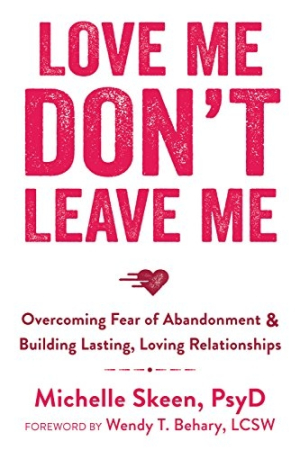Love Me, Don't Leave Me
Overcoming Fear of Abandonment and Building Lasting, Loving Relationships
Skeen’s simple-to-follow assessments and analyses of personal and relationship issues offer insight to people with abandonment issues.
Michelle Skeen’s Love Me, Don’t Leave Me takes on the issue of fear of abandonment and tasks her readers with the job of building fulfilling healthy relationships instead. Her succinct style will appeal to a wide variety of readers looking for advice to help deal with abandonment issues.
Skeen has built her therapy practice in San Francisco on such issues as interpersonal relationships and anger/depression/anxiety issues in general. She also provides more information via her radio show and website, even offering an online journaling section to follow the suggestions in the book, which uses basic information and activities to help demonstrate how abandonment issues develop and how do best deal with them.
Skeen begins her discussion of abandonment with an informative, albeit brief, look at attachment styles. She then leads into the idea that one’s core beliefs (schema therapy) about oneself as a person can impact how one relates to others. Along with the discussion of the core beliefs comes brief assessments which can help identify them so problems can be circumvented in relationships before they arise.
Anyone who struggles with being or dealing with a clingy significant other will benefit from the basic preliminary information this book provides. It’s short, and the exercises are easy to accomplish and can be quite telling. For example, one exercise involves identifying listening blocks, triggers that take away the ability to listen to someone else actively. After a brief discussion of the various types of blocks, the activity simply involves using a journal and focusing on what the trigger was that prevented listening, what the blocks employed were, and how core beliefs relate to the block.
Skeen’s writing is accessible and clear. Because the book is short, however, it feels as if there is more to be said on side topics. More information would allow readers to define their own styles and the best way to deal with the styles of their loved ones to understand conflict.
Those involved in complex, overly attached relationships will find Skeen’s advice helpful.
Reviewed by
Lynn Evarts
Disclosure: This article is not an endorsement, but a review. The publisher of this book provided free copies of the book to have their book reviewed by a professional reviewer. No fee was paid by the publisher for this review. Foreword Reviews only recommends books that we love. Foreword Magazine, Inc. is disclosing this in accordance with the Federal Trade Commission’s 16 CFR, Part 255.

